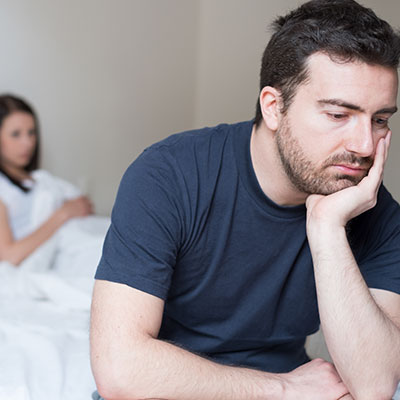HGH Therapy Benefits for Sexual Function

As people age, one of the first things they notice is a drop in the sex drive, or libido, and other sexual performance issues. In men, that usually means erectile dysfunction. As women age, they can experience a decreased desire for sex, vaginal dryness, and other sexual health issues. In both genders, these sexual problems can be related to the drop in HGH that occurs as we age.
In men and women with sexual health issues related to HGH loss, growth hormone replacement therapy can help.
How Does HGH Deficiency Impact Libido?
Human growth hormone (HGH) is proven to increase sex drive and improve sexual performance in both men and women.
As people age, one of the first things they notice is a drop in the sex drive, or libido, and other sexual performance issues — in men, that usually means erectile dysfunction. As women age, they can experience a decreased desire for sex, vaginal dryness, and other sexual health issues. In both genders, these sexual problems can be related to the drop in HGH that occurs as we age.
In men and women with sexual health issues related to HGH loss, growth hormone replacement therapy can help.
HGH Therapy Benefits for Sex Drive and Erectile Dysfunction

Statically speaking, 50% of all men have experienced erectile dysfunction at some time or another. After age 40, nearly 40% have to deal with the condition, and by 70 years old, about 70% of men experience some form of ED, usually accompanied by a loss of libido or sex drive.
In the last few decades, the number of men suffering from ED has been increasing. Scientists attribute this to anything from the greater number of hormones in our food and water supply to the increased stress in the lives of the typical adult male.
The good news is that ED, especially “age-related” ED, can be helped by growth hormone replacement therapy. HGH has been shown to both improve libido and help men with ED. Human growth hormone has been clinically proven to be a safe and effective solution for many men who are suffering from ED. When properly prescribed by your doctor, HGH therapy can be a proven alternative to oral ED medications and other ED treatments in helping many men with ED enjoy their sex lives once again.
Which Hormones Influence Erectile Dysfunction?
There are two major hormones related to erectile function, one is the “male” hormone testosterone, of course, and the other is HGH.
HGH certainly has an impact on sexual function. We cannot definitively say that low levels of HGH “cause” erectile dysfunction. But low HGH can contribute to ED and other sexual health issues in several ways.
Men with age-related growth hormone deficiency (GHD) are also inclined to suffer from other conditions that can cause or also influence ED. For example, men with GHD also tend to have low testosterone, to be obese, have hardening of the arteries, and diabetes — all of which are known to contribute to ED. In addition, men with GHD also tend to feel weak, fatigued, stressed, have poor or disrupted sleep, and can be depressed. Any, or all, of these conditions, can lead to ED and a loss of libido.
Multiple clinical studies have shown a relationship between low HGH levels and decreases in libido or sex drive and erectile dysfunction.
Is There a Link Between Growth Hormone and Erectile Dysfunction?

HGH is known to be a precursor to nitric oxide production. Nitric oxide, in turn, is fundamental to erectile function. In fact, oral ED drugs such as Viagra work by increasing the production of nitric oxide. Nitric oxide opens up the blood vessels in the erectile tissue of the penis. When these blood vessels become filled with blood, an erection is the result.
Studies have found that upon sexual excitement, HGH levels also increase in these critical blood vessels. The same studies found that men with ED had as much as seven times less HGH in their erectile tissues when non-erect than in men with normal erectile function.
Men who received HGH supplementation for other reasons, such as lack of vitality, or loss of muscle, also reported improved libido and increased ability to gain an erection. A specific 2001 study looking at the link between HGH and erectile function, published in the Journal of Urology, concluded, “our results suggest that penile erection [is] induced by growth hormone through its nitric oxide and cyclic guanosine monophosphate stimulating activity on human corpus cavernosum smooth muscle.”
HGH Benefits for Male Sexual Health
The benefits of HGH for male sexuality are many. HGH therapy has been found to:
- Improve sex drive or libido
- Provide a solution for ED
- Boost sexual performance
- Improve healthy sperm production
In addition to the above direct effects of HGH, growth hormone therapy can improve a man’s sex life in a number of other indirect ways. Let’s examine some of the factors related to poor sexual performance. ED or sexual performance issues are often caused by or at least accompanied by:
- Weakness
- Fatigue
- Depression and anxiety
- Mood swings
- Insomnia
HGH therapy has been shown to help with all of the above. It only stands to reason then that HGH can help men who feel their sex life needs a boost.
HGH Benefits for Female Sexual Health

What Does the Medical Research Say About HGH and Sexual Function?
Research indicates a there is a definitive link between arousal, HGH, and sexual function. Studies have found that upon sexual excitement, HGH levels also increase. The same studies found that men with ED had as much as seven times less HGH in their erectile tissues when non-erect than in men with normal erectile function. One such study published in 2000 concluded, “[Our] results suggest that penile erection is probably induced by growth hormone through its stimulating activity on human corpus cavernosum smooth muscle.”
Men who received HGH supplementation for other reasons, such as lack of vitality, or loss of muscle, also reported improved libido and increased ability to gain an erection. A specific 2002 study looking at the link between HGH and erectile function, published in the Journal of Urology, concluded, “our results suggest that penile erection [is] induced by growth hormone through its nitric oxide and cyclic guanosine monophosphate stimulating activity on human corpus cavernosum smooth muscle.”
A 2012 study looking into the impact of adult-onset HGH deficiency on libido in both men and women found that “a decrease of desire and arousability both in men and women, together with an impairment of erectile function in men, have been described both in patients with GHD.” The study concluded that “Data on beneficial effects of HGH replacement therapy restoring normal GH/IGF-I levels have been associated to improvement of sexual function.”
Now that you know a lot more about HGH, ED, and sexual health, why don’t you contact us today and find out about some of the other life-changing benefits of growth hormone therapy.
FAQ
What is erectile dysfunction?
Erectile dysfunction is described as the inability to obtain and maintain an erection firm enough for sex.
What causes erectile dysfunction?
ED is a complex condition with many possible causes. In addition to low testosterone or low HGH levels, some other things that could contribute to ED include:
- Stress, performance anxiety, or other emotional issues
- Certain medications you are taking
- Tobacco use
- Alcohol abuse
- High cholesterol
- Obesity
- Heart disease
- High blood pressure
- Diabetes
- Clogged arteries
- Effects of some cancers
What are the symptoms of erectile dysfunction?
There are varying degrees of ED, from an erection too soft for penetration to complete inability to get hard. The symptoms to look for include:
Erectile dysfunction symptoms might include persistent:
- Trouble getting an erection
- Trouble keeping an erection
- Reduced sexual desire
How is erectile dysfunction diagnosed?
You should see your doctor if you have concerns about your erections or you're experiencing other sexual problems such as premature or delayed ejaculation or a loss of sexual desire. Diagnosis of ED may include:
- Review of health and sexual history. This may reveal conditions that lead to ED.
- Physical exam. To look for an underlying problem, such as:
- A problem in the nervous system. This may be involved if your penis does not respond as expected to certain touching.
- Secondary sex characteristics. Things such as hair pattern can point to hormone problems, which involve the endocrine system.
- Unusual features of the penis itself. These could suggest the cause of ED.
- Lab tests. These can include blood counts, urine tests, cholesterol tests, and measurements of creatinine and liver enzymes. When low sexual desire is a symptom, checking testosterone in the blood can show problems with the endocrine system.
- Penile ultrasound. This is used to measure the blood flow in the penis.
- Psychosocial exam. This is done to help find psychological factors that may be affecting your performance. Your sexual partner may also be interviewed.
How is erectile dysfunction treated?
Treatment for ED is based on the cause of the problem. Some of the treatments that may be used include:
- Oral ED medications
- Penile injections of medications or of platelet-rich plasma (P-shot®)
- Penile implants
- Vacuum pump devices
- Treatment for Peyronie’s disease (curved penis)
- Testosterone replacement therapy
- Growth hormone replacement therapy


